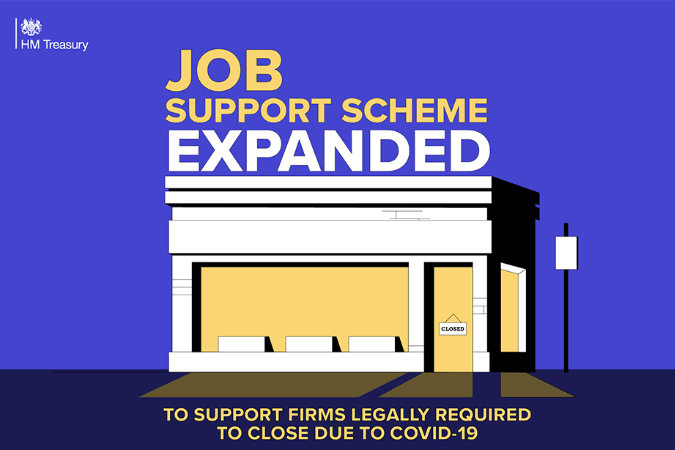Job support scheme expanded to support firms legally required to close due to Covid-19.
1. What is it?
• The Job Support Scheme (JSS) is being expanded to provide temporary support to businesses whose premises have been legally required to close as a direct result of Coronavirus restrictions set by one or more of the four governments of the UK.
• This expansion of the JSS will help businesses through the period they are affected by these restrictions, supporting the wage costs of employees who have been instructed to and cease work in eligible premises and enabling those premises to reopen as quickly as possible when they can. It will help protect employee incomes, limit unemployment and maintain employer / employee matches.
• The JSS is available to employers for six months, from 1 November 2020 and will be reviewed in January. Further guidance will be published in the coming weeks.
2. Who is eligible?
I. Employers
• In line with the rules for the JSS already announced: all employers with a UK bank account and a UK PAYE scheme registered on or before 23 September 2020 can claim the scheme. This means a Real Time Information (RTI) submission notifying payment to that employee to HMRC must have been made on or before this date.
• This scheme will cover businesses that, as a result of restrictions set by one or more of the four governments in the UK, are legally required to close their premises. This includes premises restricted to delivery or collection only services from their premises.
• The scheme will pay a grant to the employer calculated on the number of eligible employees who have been instructed to and cease work at the relevant premises.
Employers will only be able to use the scheme for employees who cannot work (paid or unpaid) for that employer.
• Employers must be instructed to and cease work for a minimum of 7 consecutive (or calendar) days. An employee can return to work at a later date.
• Claims must not overlap and must be made monthly in arrears. These payments will be taxable, and employers will be required to cover employer NICS and automatic enrolment pension contributions in full, where applicable, but are not required to make further contribution to wage costs. However, employers can top up employee pay if they wish.
• Businesses required to close as a result of specific workplace outbreaks by local public health authorities are not eligible for this scheme.
• In line with the rules of the JSS already announced, neither the employer nor the employee needs to have previously used the Coronavirus Job Retention Scheme, our expectation is that large employers using the Job Support Scheme will not be making capital distributions, such as dividend payments or share buybacks, whilst accessing the grant. Further details will be set out in guidance.
II. Employees
• Similar to the Job Support Scheme, where employees receive two-thirds of their wages for time not worked, the grant per eligible employee available from the UK Government is two-thirds of their normal pay up to a limit of £2100 per month. Further detail on how normal pay is calculated will be set out in guidance.
• Your employer can claim under the rules announced today (9 October) if their premises are closed. When premises re-open, employers can claim under the JSS for firms facing reduced demand under the criteria set out on 24 September.
• In line with the announced JSS, employers will be able to claim the Job Retention Bonus for employees provided they are eligible and previously part of the CJRS. JSS grants can be used by employers to pay an employee’s wages and help meet the JRB Minimum Income Threshold.
• Employees cannot be made redundant or put on notice of redundancy during the period within which their employer is claiming the grant for that employee.
3. What does the grant cover?
• The employer must use the scheme to cover their employees’ wages and pay relevant payroll taxes. The whole of the grant must be used to meet employee costs.
• The grant will not cover Class 1 employer NICs or pension contributions, although these contributions will remain payable by the employer.
• Payments will be made in arrears, reimbursing the employer for the Government’s contribution.
4. How can I claim?
• This is a temporary scheme, available to employers from 1 November 2020 for 6 months and will be reviewed in January.
• Employers will be able to make a claim on a monthly basis online through gov.uk from December 2020 and this will be reviewed in January 2020.
5. HMRC checks
• HMRC will check claims. Payments may be withheld or need to be paid back if a claim is found to be fraudulent or based on incorrect information. Grants can only be used as reimbursement for wage costs actually incurred.
• Employers must agree the new scheme with the relevant staff, make any changes to the employment contract by agreement, and notify the employee in writing. This agreement must be made available to HMRC on request.
• HMRC intend to publish the name of employers who have used the scheme, and employees will be able to find out if their employer has claimed for them under the scheme. HMRC will continue to operate a hotline for individuals to make reports of any fraudulent claims they may be aware of.

